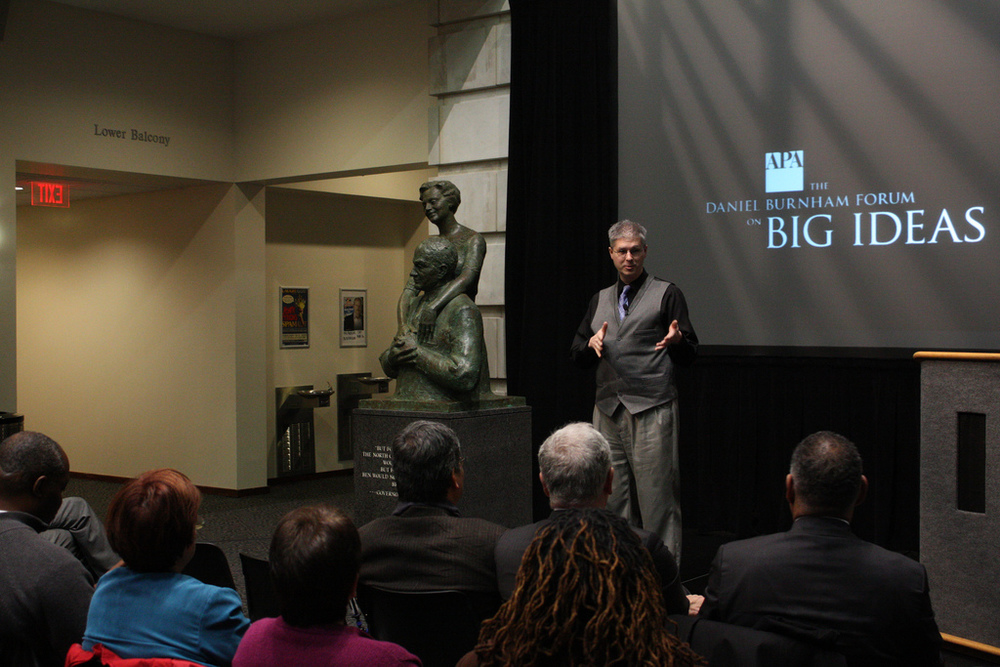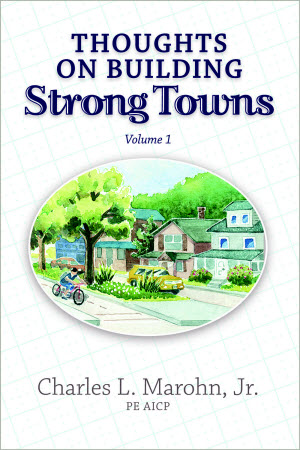Friday News Digest
Another week of catch up and preparation as I was in Raleigh and then Kansas City last week and am headed, along with Andrew Burleson, to Idaho next week. Andrew and I will be flying into Boise this Sunday and then have stops scheduled the entire length of the state over the next five days. Of the 50 states, there are only seven I've not been to: Alaska and Hawaii, Connecticut and Rhode Island in the Northeast and then Washington, Oregon and Idaho in the Northwest. In May I'll be in Washington and I have also been invited to Hawaii this fall so the list is set to shrink further. I feel very fortunate to have seen so much of the county.
Andrew and I will be blogging, video taping and podcasting from the road next week, so stay tuned for updates from Idaho.
Enjoy the week's news.
- I enjoyed this piece by MIT Knight Fellow, and London resident (when not at MIT), Angela Saini, who heard me speak at MIT last fall and offered her own thoughts as a follow up. I'm continually amazed and honored by the many ways in which very intelligent people interpret and apply my work. Thank you, Angela, for letting these thoughts infect part of your brain.
The solution (perhaps predictably) is for town planners to start thinking far longer term when building new housing and infrastructure, to make sure that subsequent generations don't end up in debt. To me at least, this seems to spell the death knell for the American Dream. The future may have to be more European: smaller, narrower streets with concentrated housing and plenty of public transportation. The question is: is it too late to shrink the American town?
- I also have to thank Dean Cracknell (Twitter) at the blog The Freemantle Doctor for taking my Confessions of a Recovering Engineer piece and applying it to Perth. He quotes extensively and then follows with two case studies. He concludes:
Thinking about Scarborough Beach Road with Charles Marohn’s and Fred Kent’s words in mind, I’m convinced that they’re onto something. Speed must not be the priority when we design our roads and, if we plan for cars, then traffic is what we’ll get (and what we'll deserve).
- Speaking of firsts, it was quite an honor to visit Raleigh for the first time last week and be asked to lecture at the APA's Daniel Burnam Big Ideas Forum. It is no secret that I've become a huge fan of Mitchell Silver, the current APA president, and am going to be really sad to see his term end in the coming months. Although APA's loss is Raleigh's gain as they are obviously on the right track there working to implement a Strong Towns approach (even before there was such a thing).

- Another thought leader I admire is Kevin Klinkenberg, who wrote a very intelligent piece about Kansas City last week prior to the New Partners for Smart Growth conference. I declared a unilateral truce with Kansas City yesterday so I'll refrain from any gratuitous comments, but I do see people like Kevin as the greatest hope for a city that is currently obsessed on becoming the next Detroit.
I’ve advocated as best I knew how, which by my own admission has had mixed results. Sometimes my urgings were tactful and well received; sometimes they were less-tactful rants that were duly ignored. Often I was given a polite platform to express my views and lead discussion, but was personally frustrated by the slow pace of change.
My issues have always been wrapped up in KC’s wholesale acquiescence to the car culture. That mindset runs completely counter to how I wish to live, and what an increasing number of people are looking for in a community. It’s not that I’m anti-car. I’ve owned a car continuously since I was 16 years old. But what I don’t want is to be held hostage by that car. I prefer to live somewhere that allows me to live a rich and full life primarily by walking, biking and using public transportation.
- In terms of hope, I've found an engineer that is insightful, thoughtful and -- to top it off -- writes really well. His name is Dave Alden and he blogs at Where do we go from here? This week Dave organized a virtual Curbside Chat in Petaluma, California. I had a really great time meeting with him and other members of his community. They had great questions that were obviously made more thoughtful by Dave's gentle prodding. Yeah, Petaluma.
In the early 17th century, tulips bulbs were selling in Holland for up to ten times the annual salary of a skilled craftsman. Less than a century later, the South Sea Bubble in Great Britain, which was more about speculation in government debt than about the South Seas, caused economic upheaval and the transfer of great wealth.
So, if we can create bubbles in tulips, government debt, and housing, is it possible, as Strong Towns argues, that there can be an infrastructure bubble? Given the way in which we’ve made infrastructure decisions in recent decades, the only surprising thing would be if there wasn’t an infrastructure bubble. And the fact that infrastructure isn’t a free market doesn’t really help. Central planning can also create bubbles. (See the USSR.)
- If you haven't yet read the McClatchy piece on highway spending, you really need to. I did an entire podcast on it. Some of the best journalism I've seen in a while.
America’s highway system, once a symbol of freedom and mobility envied the world over, is crumbling physically and financially, the potentially disastrous consequence of a politically driven road-building binge.
- Patrick Kennedy at WalkableDFW continues to do amazing work in the most difficult of circumstance. I recently ran across this piece where he again points out how to do so much more with so much less.
By removing the highway, restitching the grid, and creating developable blocks, the city would see $4 billion in new investment within 15 years and generate $100 million a year in property tax revenue, based on our economic impact analysis. That’s enough in one year to implement the entire bike plan and build a new modern streetcar line from West End to Lower Greenville. Through land sales, TxDOT can generate some revenue to begin paying down its debt rather than adding to it.
- The solid logic behind the Economic Gardening concept is slowly but surely infiltrating thought circles around the country. This is partially because of the fact that decades of bad economic development policy has become too destructive to ignore and partially because the body of work is brilliant. A recent Harvard Business Review article is simply the latest conversation. If you are not aware of the Economic Gardening movement, you really should be.
Extraordinary value creation cannot occur without growth, and entrepreneurial growth post start-up has numerous challenges which can be an order of magnitude more difficult than simply starting a venture. Growth entails developing a powerful sales and marketing machine, building an organization by hiring and managing diverse groups of people, and knowing how to acquire strategic inputs such as the right kinds of capital and suppliers. Growth requires amazing amounts of energy and dedication, not to mention smarts. Forward-looking policy, as well as culture and the private sector, must support all these skills and resources more than it does at present.
- On the flip side of the forward thinking of Economic Gardening, in the Mississippi legislature you see a glaring example of old school thinking with a recent bill to give a new outlet mall tax credits by declaring it a "cultural retail attraction".
The state Senate has passed a bill to add “cultural retail attractions” to the definition of a tourism project so the new outlet mall being built in Pearl will qualify for roughly $22 million in sales tax incentive funds.
- I had to chuckle a little bit at this one because of the perverse incentives of trash collection. Yes, when you recycle you make less money on trash collection, a very predictable outcome for which we should not lament. In fact, if we harness these market forces we may find we have very little need for trash collection. Of course, if you are planning to run part of your police or road budget on money you are paid to house other people's trash, well....
Plans to cut down on how much of Minnesota's trash ends up in garbage dumps could have an unintended consequence in Dakota County: As the last of the seven metro counties to have mixed municipal waste landfills, it could lose hundreds of thousands of dollars annually in landfill host fees.
The Minnesota Pollution Control Agency (MPCA) plans to start enforcing a law in mid-February that will force garbage haulers to use garbage burners to their full capacity before taking any trash to landfills, potentially keeping an extra 140,000 tons of trash from being dumped each year.
- This was a beautifully written article that is only slightly related to what we talk about here each day but worth sharing regardless.
- While my own personal weight loss has plateaued at about 30 pounds -- about ten short of my goal -- I continue to use my treadmill desk as one of many strategies to get healthier. I thought it was hilarious to read this article about people who have had problems with spelling and the like as well as those that have gotten injured on theirs. Seriously, you can safely do pretty much anything at 1 MPH. Do that for six hours and you've walked six miles instead of simply sat at your desk. I do a lot of writing from a treadmill desk and highly recommend it, just don't confuse it with working out at a gym. Speed is not the objective here.
When John Osborn’s treadmill desk arrived in his corner office last August, the New York CEO of advertising firm BBDO spent nearly 80% of the day working while walking. But soon colleagues began pointing out rampant misspellings in his emails. “You quickly realize how difficult it is to type anything longer than a sentence,” he says. And while he had hoped to drop some weight, he found that after a few weeks, his appetite increased. “The big joke around here was I got the treadmill desk and I put on 6 pounds,” Osborn says.
- Morning Mountain Dew. This has to be what a sober man feels like when he is dropped into the middle of Octoberfest.
- And finally, I have not shared any Super Bowl commercials on the FND -- I don't have cable anymore and so only watched brief parts of it on my PC -- but one of my friends sent me this one. I did wonder where it was all going but then found it hilarious once it was revealed that the guy was from Minnesota. Da land of tain tousen lakes.
Have a great weekend everyone. We'll get back to you from Idaho next week as we share our message throughout the state.
 If you'd like more from Chuck Marohn, you should really get a copy of his recent book, Thoughts on Building Strong Towns (Volume 1). It is a primer on thr Strong Towns movement and an essential read for those wanting to get up to speed quickly.
If you'd like more from Chuck Marohn, you should really get a copy of his recent book, Thoughts on Building Strong Towns (Volume 1). It is a primer on thr Strong Towns movement and an essential read for those wanting to get up to speed quickly.
You can also chat with Chuck, Nate Hood, Andrew Burleson, Justin Burslie and many others over at the Strong Towns Network. Join the conversation on how to make yours a strong town.
